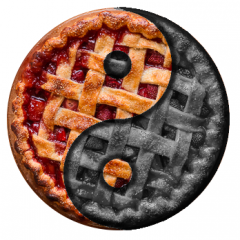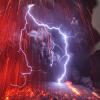Appliantology Newsletter, August 2011: Appliances and Disasters
Appliantology Newsletter, August 2011: Appliances and Disasters
0. Introduction
1. Can I use my appliances during a disaster?
2. Does it hurt my appliances to run them or have them plugged in while the power is blinking on and off?
3. Can running my appliances off a generator damage them?
4. What about water?
5. How do I store food safely while the power is out?
6. Epilogue
### ### ### ###
0. Introduction
With Hurricane Irene rampaging up the East Coast and record-breaking earthquakes off the coast of Virginia (or a nuclear detonation in a sea bed bunker, depending on who you're listening to), disaster prep seemed like the obvious topic du jour for this Special Irene Edition of *Appliantology*.
### ### ### ###
1. Can I use my appliances during a disaster?
Using appliances during a storm or other disaster can be risky to the appliance because of the power going on and off, voltage spikes (more on that below), trees falling on power lines, etc.
Even most gas appliances need electricity. For example, the spark module for your gas stove burners won't work though the burners are still usable by manually lighting the gas, which is perfectly fine; it's safe and doesn't hurt the appliance. Just don't use the gas stove to heat your house!
Most modern gas ovens with hot surface ignition require 120vac to heat up the ignitor and there's no manual bypass for that so, without a power source, you won't have an oven.
### ### ### ###
2. Does it hurt my appliances to run them or have them plugged in while the power is blinking on and off?
Absolutely! Every time that power blinks off and goes back on, it slams your appliances with transient voltage spikes. Depending on the severity of the spikes, these can fry control boards right away or slowly degrade them over time through a process called electronic rust. After getting slammed with a finite number of such spikes, the electronic control board(s) will eventually fail (at great expense and inconvenience to you).
To prevent this unhappy and completely avoidable scenario, any appliance with an electronic control board in it-- which is most of 'em today-- should be plugged into a surge suppressor, not directly into the wall. Surge suppressors for common household 120vac outlets are inexpensive and you can get 'em at your local hardware store. This will provide reasonable protection for all your 120vac appliances. Read more about surge protection for your appliances here... http://fixitnow.com/?p=1523
To protect your 240vac appliances with fancy control boards during a storm, such as an electric range with a digital display, you should switch off the circuit breaker to that appliance until the coast is clear.
### ### ### ###
3. Can running my appliances off a generator damage them?
If you haven't purchased a generator by now, it's probably too late for the Irene event. But in case you can (or already have a generator you're planning to use), here are some fun facts to know and tell about using generators with appliances.
For appliances with electronic control boards-- which is most appliances today-- you should only use generators that produce a pure sine wave output.
Most generators produce a modified sine wave output, which is not a pure sine wave but more of a stylized square wave. This is fine for motors but not good for the AC-to-DC rectifiers in appliances. The modified sine wave messes with the rectifier, making it overheat and crank out off-spec voltages for the control board. The result is often burned out rectifiers and fried control boards.
Producing a pure sine wave output requires much more sophisticated circuitry in the inverter and usually only comes with more expensive, higher-end generators. It's a big selling point, too, so if a generator doesn't specifically say it's a pure sine wave generator, then it's safest to assume that it only puts out a modified sine wave.
So, if you do not have a generator that produces a pure sine wave output, be careful to only run appliances that do not have electronic control boards.
Oh, and one point of safety: don't run your generator inside the house. I know, it sounds crazy to even say it but there are knuckleheads out there who do that kind of thing. Like this guy... http://fixitnow.com/?p=693
### ### ### ###
4. What about water?
Flood waters in urban areas are a lethal cocktail of sewage, petroleum products, and just about every kind of chemical you can imagine. Simple disinfection (e.g., boiling, chlorine drops, iodine drops, etc.) is woefully inadequate for this water. You can treat the water so it's safe from pathogens and it can still be lethal because of the gasoline, mercury, or any one of thousands of other contaminants commonly found in urban Ameedika.
The other problem is that coastal flood waters will also be either salty or brackish which, in itself, renders the water undrinkable.
The best treatment for making flood waters potable is distillation. Reverse osmosis is the next best thing. If you can't treat flood waters using either of these two methods, don't drink it at all!
Bottled water is the best bet but there are logistical limitations on how much you can store.
### ### ### ###
5. How do I store food safely while the power is out?
I posted some information on food preservation and safety during disasters. You can read it here: http://fixitnow.com/?p=6515.
### ### ### ###
6. Epilogue
As we say in Fukushima, "Rots of ruck, GI!"
Samurai Appliance Repair Man
The Samurai School of Appliantology
Find and Buy Appliance Parts







0 Comments
Recommended Comments
There are no comments to display.